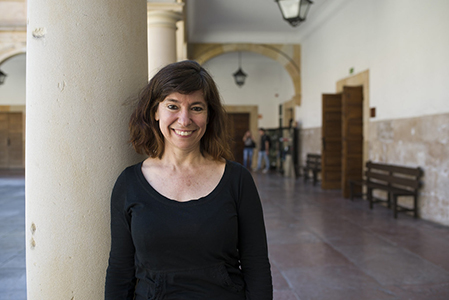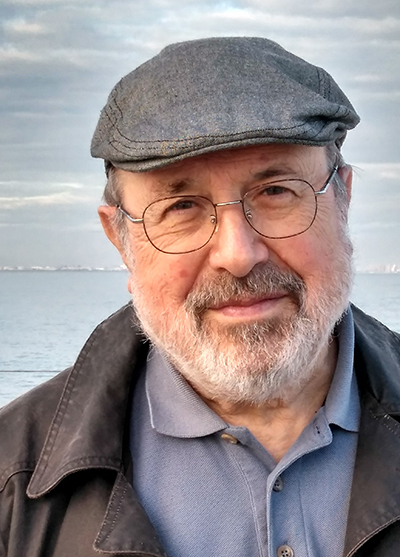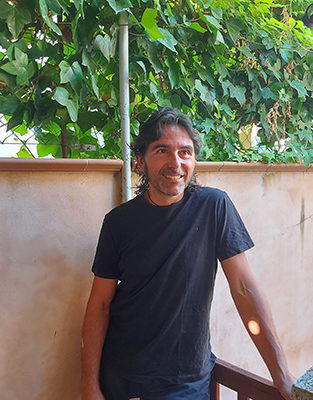Yayo Herrero

Consultant, researcher and professor in the fields of political ecology, ecofeminism and education for sustainability. She has a degree in Social and Cultural Anthropology, a qualification in Social Education and Agricultural Technical Engineering, and a Diploma of Advanced Studies in Educational Theory and Social Pedagogy. She is currently a partner at Garúa S. Coop. Mad. and teacher at various Spanish universities. She is author and co-author of more than thirty books and regularly collaborates with various media outlets.
Arquitectives

Collective formed by Pablo Amor Méndez and Cristina Llorente Roca, architects specialised in urban planning and the environment, urban management and citizen participation, as well as being Spanish delegates of the Architecture & Children international work programme of the International Union of Architects (UIA). As the Arquitectives collective they have been working since 2009 on the dissemination and transformation of architecture, urban environments and landscape, in the fields of both design and education, through a participatory, collaborative, integrationist, ecosystemic and didactic approach.
They have taught university courses and given conferences on these topics around the world (Madrid, Helsinki, Weimar, Bucharest and Sofia, among others). Their publications include Edu y la mejor casa del mundo (self-published, 2005), Escola i paisatge de Mallorca (Consell de Mallorca, 2020), Guia urbana de l’Eixample de Palma (Palma XXI, 2019) and Ecosistemes urbans (Conselleria de Medi Ambient, 2020), as well as scientific and opinion articles in both Spanish and international publications. www.arquitectives.com
Basurama

Collective currently formed by Mónica Gutiérrez Herrero, Rubén Lorenzo Montero, Alberto Nanclares da Veiga and Manuel Polanco Pérez-Llantada. Established in 2001 at the Higher Technical School of Architecture of Madrid, they work in the fields of art, architecture and the environment, focusing their areas of study and action on the city, production processes and the generation of waste they imply, and on the creative possibilities raised by these contemporary conjunctures. They aim to study phenomena inherent in the massive production of real and virtual rubbish in consumer society, providing new visions that act as generators of thought and behaviour. They detect chinks within these processes of production and consumption that not only raise questions about our way of exploiting resources, but also about our way of thinking, working and perceiving reality. They use rubbish in its broadest sense as a starting point, as a means and as an end through which to think of and construct new possibilities. Networking, active participation, creativity and highlighting the importance of local resources are the keys to developing social transformation projects.
Basurama has become a multidisciplinary space in which disparate activities take place simultaneously, but all with a common focus. Along with the visual arts in their broadest sense, all types of workshops, lectures, concerts, screenings and publications have a place. The collective also aims to establish a platform so that people who form part of the social fabric, who occupy very different places yet are not too far apart, can come into contact and work together, also considering the collective as a creative hub/meeting space. They have carried out more than one hundred projects on four continents, are based in Madrid and have a permanent office in Bilbao.
Ernest Garcia

Emeritus Professor at the University of Valencia, where he was Professor of Sociology, Director of the Department of Sociology and Social Anthropology, Dean of the Faculty of Social Sciences and coordinator of ESDESOST (research group in sustainability studies). He has published: El trampolí fàustic. Ciència, mite i poder en el desenvolupament sostenible (Germania, 1995), Medio ambiente y sociedad. La civilización industrial y los límites del planeta (Alianza, 2004), Transitioning to a Post-Carbon Society: Degrowth, Austerity and Wellbeing (Palgrave Macmillan, 2017) and Ecología e igualdad. Hacia una relectura de la teoría sociológica en un planeta que se ha quedado pequeño (Tirant lo Blanch, 2021). He was also a member of the coordinating committee of the network on environment and society of the European Sociological Association and president of the Valencian Sociological Association.
Luis González Reyes

Doctor of Chemistry. He is a member of Ecologistas en Acción, where he was confederal coordinator for nine years. He is a partner at Garúa S. Coop. Mad., which is dedicated to facilitating eco-social transition by promoting hands-on practices, training, researching and accompanying processes. In these four areas he works specifically on issues related to environmentalism, economics and pedagogy. He is a regular collaborator of several universities in this field. He also works at FUHEM, where he is the eco-social education coordinator. This encompasses multiple tasks, among which the development of a curriculum with an eco-social approach for all stages and didactic materials stands out.
He also coordinates organic and healthy school meals, and participates actively in various equitable and resilient organisations such as Entrepatios (housing), El Arenero (parenting) and Las Carolinas (food). He is author and co-author of a score of books on different facets of social environmentalism, among them En la espiral de la energía (Libros en Acción, 2018) and Educar para la transformación ecosocial (Fuhem Ecosocial, 2018).
Ivan Murray

Professor in the Department of Geography at the University of the Balearic Islands (UIB). He has a PhD in Geography from the UIB and an MS (Master of Science) in Environmental Sustainability from the University of Edinburgh. He has taught undergraduate, graduate and master’s degrees in geography and tourism studies. His lines of research are framed within the perspective of critical geography, bringing together forms of analyses from political economics, political ecology and sustainable economics. His research focuses on studying the spatial logics of capitalist tourism, its contradictions and its associated conflicts. His publications include the following books: Geografies del capitalisme balear (UIB, 2012), Capitalismo y turismo en España (Alba Sud Editorial, 2015), Turistificación global. Perspectivas críticas en turismo (Icaria, 2019), Tourism and Degrowth (Routledge, 2020) and #TourismPostCOVID19. Turistificación confinada (Alba Sud Editorial, 2021).
He has also published numerous academic articles. He is a member of the Research Group on Sustainability and Territory of the UIB and of the Transdisciplinary Research Group on Socio-ecological Transitions of the Autonomous University of Madrid (UAM), and is part of the editorial teams of Scripta Nova and Political Ecology magazines. He also participates in environmentalist and anti-capitalist social movements. Among others, he is linked to Grup d’Ornitologia i Defensa de la Naturalesa (GOB) and was part of the Tot Inclòs collective. He also collaborates with the Alba Sud organisation in relation to the critical analysis of touristification and the search for counter-hegemonic alternatives.
Margalida Ramis

Degree in Physics and is an ecofeminist activist. She has worked in the fields of energy management and renewable energies, at the head of the Energy Agency of Menorca and the Balearic Islands, as well as in the field of consulting on waste management. She began her studies at the Department of Geography of the University of the Balearic Islands (UIB) as a member of the Research Group on Sustainability and Territory (GIST). She was founding president of the Balearic Islands branch of the Ingeniería Sin Fronteras NGO.
Currently, and for the past ten years, she has worked in Grup d’Ornitologia i Defensa de la Naturalesa as spokesperson and head of the Area of Territory, Resources and Eco-social Transition. In relation to the dissemination of social and political environmentalism, she gives workshops and talks, participates in courses and seminars and regularly collaborates with various media such as La Directa, Ona Mediterrània Ràdio and Ara Balears newspaper, and also with the Alba Sud and Conca 5.1 associations.
